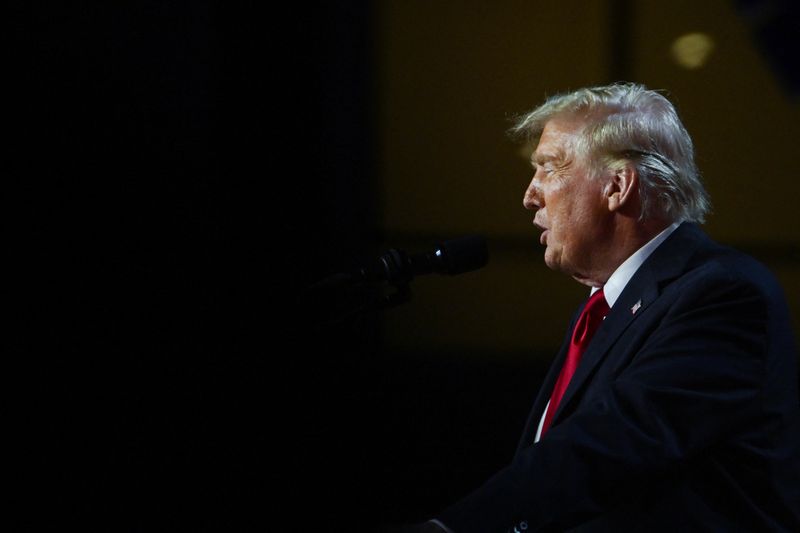By Selena Li, Scott Murdoch and Kane Wu
HONG KONG/SYDNEY (Reuters) - More U.S. financial firms may pull back from China, hive off local units to minimise risks or pause expansion plans on concerns about geopolitical tensions in a Donald Trump presidency, industry executives and analysts said.
Mainland China was a lucrative market for Wall Street investment banks and major U.S. asset managers to expand in the decade leading up to the pandemic as the world's second-largest economy recorded double-digit economic growth.
However, those firms now face risks of even more trade tensions between Beijing and Washington under a new U.S. administration with their Chinese units already reeling from faltering economic growth and regulatory changes that have hit revenues.
Trump, who recaptured the White House with a sweeping victory on Wednesday, has proposed tariffs on Chinese imports in excess of 60% and ending China's most-favoured-nation trading status.
There are also concerns about the measures he could take to make U.S. capital inflows into China and American financial firms working with some Chinese companies tougher, analysts said.
Singapore-based consulting firm Kapronasia's research director Joe Jelinek said Trump would likely bring a tougher stance on China, increasing regulatory risks for U.S. financial firms operating there.
New or increased tariffs and capital restrictions could discourage Wall Street firms from expanding into China, as they face heightened scrutiny and potential compliance issues, he said.
"Rather than Beijing closing its doors, it's likely that American firms themselves would reconsider their China strategies to mitigate these risks," Jelinek said, adding that could lead to a pullback or delayed investments.
A senior executive at a China-licenced entity of a large U.S. financial firm told Reuters that his firm had gone through a few rounds of "risk management meetings" at headquarters in months leading up to the election.
As a result of Trump's return to the White House, the firm now focuses on making its China business a "self-sustained" independent operating unit, said the executive, declining to be named due to the sensitivity of the matter.
"It will be a very bumpy road ahead for U.S financial companies doing business in China with Trump returning to the White House," said the executive. "'De-Americanise' has now become a guiding principle."
STRATEGY RETHINK
Some Wall Street firms have already shrunk their Chinese footprints as a slowing economy and sharper regulatory scrutiny of corporate dealmaking and fundraising over the last couple of years dimmed the market's revenue potential.
The top five U.S. investment banks - Goldman Sachs, Morgan Stanley (NYSE:MS), JPMorgan, Bank of America and Citigroup (NYSE:C) - have earned $454 million in Chinese investment bank revenue in 2024, according to Dealogic data.
That figure is up from the 2023 full year revenue of $276 million, but well down on the peak of $1.6 billion in 2020, the data showed. Geopolitical tensions even in Joe Biden's presidency led some firms to rethink their China strategy.
U.S. asset manager Van Eck dropped plans to set up a shop in China in 2023 due to Sino-U.S. tensions, sources told Reuters, while Vanguard withdrew from its China joint venture operations in the same year.
Over 10 U.S. law firms have closed all or one of their China offices since last year, according to media reports and public announcements. Law firms Mayer Brown said it would hive off its Hong Kong operations this year, while Dentons last year split with its mainland China teams.
Christopher Beddor, deputy China research director at Gavekal Dragonomics, said that U.S. financial firms' immediate focus would be on Trump's tariffs and how Beijing responds to that.
"I think we're in for the most uncertainty around U.S.-China relations in years," said Beddor. "There's simply a much wider range of plausible outcomes for just about every area of U.S.-China relations under Trump."

Another senior executive of a U.S. financial firm's China unit, however, said some Wall Street firms may want to take advantage of Beijing's continued push to give foreign firms more financial market access.
"You don't stop going to work because you are afraid of car accidents. They do happen a lot but we want to make sure we don't overreact," said the general manager, also declining to be named due to sensitivity of the matter.
